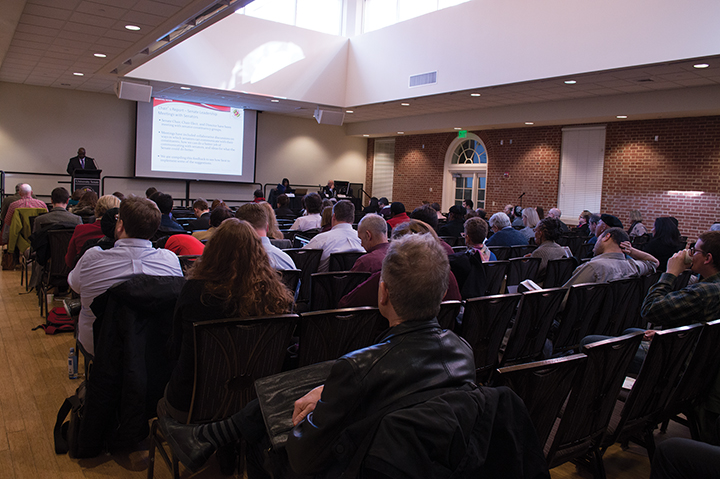The University of Maryland Senate voted 78-14 to pass a proposal to update the faculty grievance policy and decrease lawyers’ role in the process.
The updated policy, which university President Wallace Loh is expected to approve next week after the senate approved it on April 4, would allow complainants to use lawyers as advisors during proceedings instead of having them play an active role as currently allowed. Under the current policy, lawyers can speak directly to the hearing board on behalf of the faculty member, but under this policy, they would speak only to the faculty member, who would then address the board.
Filing a grievance is not a legal proceeding, so lawyers should not be playing an active role, the proposal read.
[Read more: UMD Senate bill would require all new school websites be accessible to those with disabilities]
Using lawyers during proceedings is difficult for the hearing board — which is made up of five appointed faculty senators — to respond to, Senate Director Reka Montfort said.
“It should be an administrative process,” Montfort said. “The people that are on the panels reviewing these cases are not lawyers, and so it adds a level of complexity to it when you include lawyers to something that is not a court proceeding.”
The updated policy would also align the faculty grievance process with student conduct proceedings, which similarly allow lawyers to advise students only and not to speak directly to the hearing board. If a faculty member chooses to file a legal complaint beyond this university’s hearing board, they may use a lawyer in an active role — allowing them to speak on the faculty member’s behalf — said Jason Kahn, a faculty senator representing the chemistry and biochemistry departments.
In both versions of the policy, faculty members can file a grievance due to actions or inactions considered unfair, discriminatory or improperly reached. The updated policy would clarify what causes something to fall under one of these categories, which were previously undefined. Unfair actions lack justifiable cause; discriminatory actions or inactions are those made based on a protected status including race, ethnicity and gender; and improperly reached refers to a decision made without required consultations or approvals.
[Read more: A university senate proposal will allow UMD librarians to apply for promotions sooner]
At the meeting, Kahn proposed two amendments to the policy. One suggested clarifying language regarding when faculty can file a grievance complaint — they currently have 75 working days from the latest action or inaction to file — and another called to allow the hearing board to separately recommend whether someone should receive repercussions for their actions, alongside the facts presented in the case. The first amendment passed 56-33, while the second failed in a 44-43 vote.
“[I] felt that the benefit of our experience in hearing the case was lost. I thought that future panels should have the opportunity to make recommendations,” Kahn said, adding that he recognized that basing decisions on facts protects the university in cases where the complaint is brought to court.
When updating the policy, the Faculty Affairs Committee reviewed previous cases and the grievance policies of other Big Ten institutions. They looked at the role of legal counsel and hearing board membership, committee chair Roberto Korzeniewicz said.
“[The] Faculty Affairs Committee intends for these changes to have a positive impact on the grievance process,” Korzeniewicz said. “The proposed changes create a more streamlined and straightforward process, and all parties should more easily understand what to expect in going through this process.”



